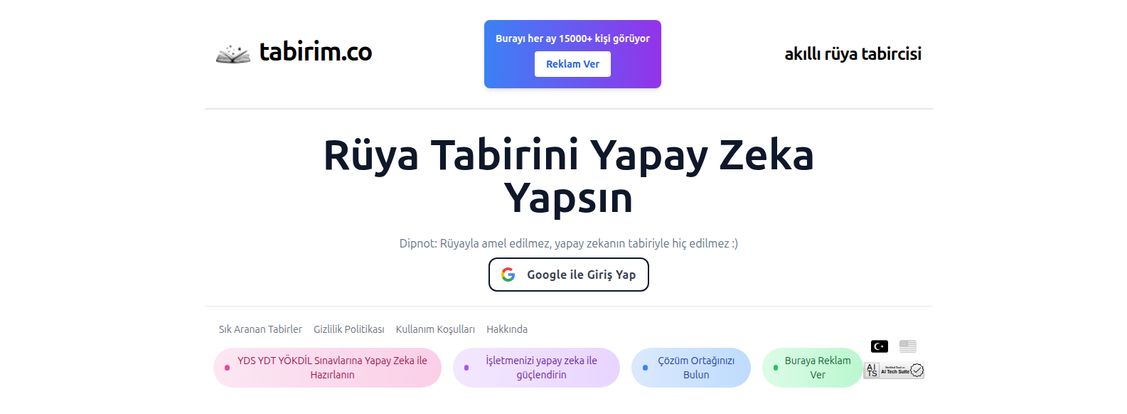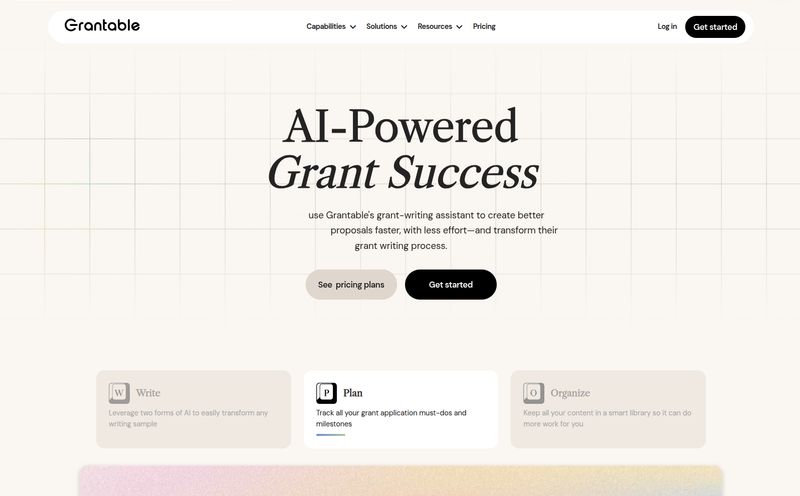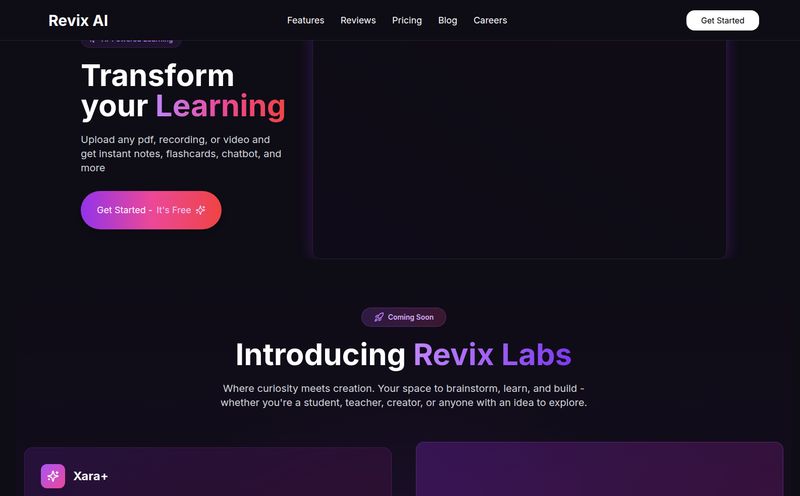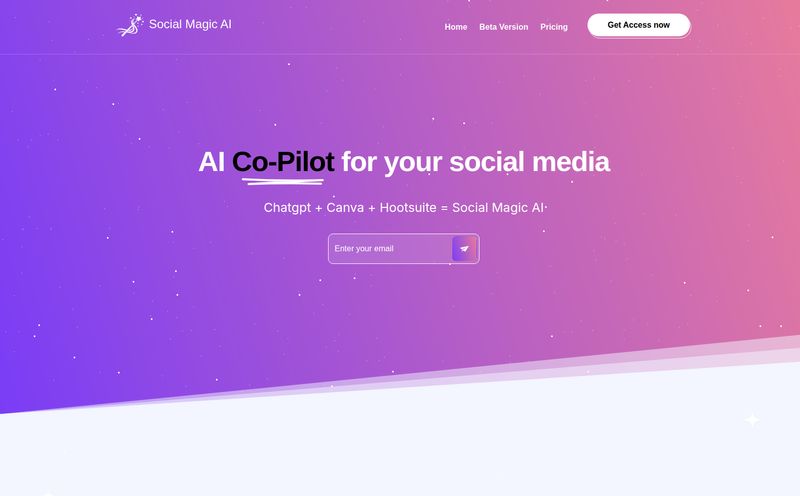We’ve all been there. You wake up in a cold sweat, heart pounding, with the ghostly remnants of a bizarre dream clinging to you. Maybe you were flying over your childhood home, but your wings were made of soggy toast. Or you were taking a final exam you hadn't studied for, only the professor was a giant, talking hamster. The first thing you do? You grab your phone and google “dream about soggy toast wings.”
For years, our options have been pretty limited. You could thumb through a dusty old dream dictionary your aunt gave you, where every other symbol somehow means “impending wealth” or “a secret journey.” Or you could drop a pretty penny on a therapist to unpack it all. But we're in a new age now, an age where artificial intelligence is poking its digital nose into everything. From writing our emails to creating our art, and now, it seems, to interpreting our very subconscious.
Enter Tabirim.co, a platform that promises to do just that. It calls itself an “akıllı rüya tabircisi” — a smart dream interpreter. The premise is simple: you tell the AI your dream, and it gives you a personalized interpretation in seconds. As someone who’s spent more time than I'd like to admit in the SEO and digital trends trenches, I've seen AI do some amazing things. But the human subconscious? That feels... different. A little more sacred, maybe? I had to see for myself if this was the real deal or just another clever gimmick.
So, What Exactly is Tabirim.co?
At its core, Tabirim is a web-based tool that uses AI to analyze the text of your dream and provide insights. Think of it as a high-tech version of that dream dictionary, but instead of generic, one-size-fits-all answers, it tries to weave your specific details into a more coherent narrative. It's designed to be quick and easy, a sort of first-response unit for your nightly brain-movies.
The first thing I noticed when I landed on the page was the minimalist design. And, well, the Turkish. The main headline, “Rüya Tabirini Yapay Zeka Yapsın,” translates to “Let Artificial Intelligence Do the Dream Interpretation.” I kinda loved that. It’s direct, no-nonsense. You log in with a Google account, and you're ready to go. No lengthy sign-up forms, no credit card nonsense, just you and the AI, ready to get weird.

Visit Tabirim
My First Spin with the Dream Machine
To give it a fair shake, I didn't want to give it something easy like “I dreamed I was falling.” That’s Dream Interpretation 101. I decided to throw it a real curveball from my own strange dream journal. Something with conflicting emotions and bizarre symbols.
I typed in a dream I had a few weeks ago about finding a tiny, ornate key in a fishbowl, but when I used it to unlock a door, the room behind it was just a perfect, empty replica of the one I was already in.
I hit enter and waited. The response came back in what felt like less than 10 seconds. The AI picked up on the key symbols (opportunities, secrets), the fishbowl (feeling observed or confined), and the repeating room (cycles, introspection, maybe feeling stuck). It suggested that I might be searching for a breakthrough in my life but fear that the change won't be as significant as I hope. It wasn't a mind-blowing, life-altering revelation, but... it wasn't wrong. It was a surprisingly coherent and thoughtful starting point for reflection. Way more useful than “a key means you will soon receive an inheritance.”
The Good, The Bad, and The AI-Weird
The Things I Genuinely Liked
The biggest win for Tabirim is its immediacy. There's a certain magic to getting instant feedback on a dream that’s still fresh in your mind. It’s a fantastic tool for sparking self-reflection. The AI’s interpretation acted like a prompt, giving me angles I hadn't considered and forcing me to ask myself, “Hmm, do I feel like I'm in a repeating cycle?” In my experience, anything that encourages you to look inward with new questions is a plus.
It’s also incredibly accessible. It’s free (as far as I can tell) and available 24/7. Your subconscious doesn't keep office hours, so why should your interpreter?
Where It Gets a Little Murky
Now, I know what some of you are thinking. Can an algorithm, no matter how smart, truly understand the deep, personal context of a dream? Your childhood memories, your unique anxieties, the fight you had with your partner yesterday? The short answer is no. This is where a human expert—a real therapist—is irreplaceable. An AI can spot patterns and symbols, but it can’t understand the feeling behind them. It lacks the empathy and lived experience that real understanding requires.
This brings me to the most fascinating thing about Tabirim. The website itself seems to agree with me. At the bottom of the page, there's a little disclaimer in Turkish: “Dipnot: Rüyayla amel edilmez, yapay zekanın tabiriyle hiç edilmez :)”
This roughly translates to: “Side note: One does not act upon dreams, and especially not upon the interpretation of an AI :)”
The smiley face at the end is just perfect. This isn't buried in a 50-page terms of service document; it’s right there on the homepage. This level of self-awareness is incredibly refreshing. The creators know their tool's limitations. They're not selling snake oil; they're offering a fun, modern tool for introspection and basically saying, “Hey, this is cool, but dont quit your job or break up with your boyfriend because our robot said so.” I have to give them major points for that kind of responsible design.
Who Is This Dream Interpreter Actually For?
So, after spending some time with it, I have a pretty good idea of who would get the most out of Tabirim.co.
- The Curious Journaler: If you keep a dream journal, this tool is a fantastic companion. It can give you new keywords and themes to explore in your writing, helping you go deeper than just recording the plot.
- The Self-Reflection Dabbler: Not ready to commit to therapy but curious about what's going on in your head? This is a zero-pressure, zero-cost way to start exploring your own thoughts and feelings.
- The Creatively Stuck: Honestly, I could see artists, writers, and other creatives using this as a bizarre brainstorming tool. Feed it a strange image, and see what symbolic connections the AI spits out.
It is definitely not for someone experiencing severe mental or emotional distress. This is a wellness tool, not a medical one. It's a funhouse mirror, not an X-ray. Please, if you are struggling, seek help from a qualified human professional. The National Institute of Mental Health has great resources for finding help.
The Bigger Picture on AI and Personal Wellness
Tabirim.co is part of a much larger trend of AI being integrated into our personal wellness routines. We have AI-driven meditation apps, chatbots designed to help with anxiety, and fitness programs that adapt to our biometrics. It's a fascinating and ethically complex field. On one hand, these tools make self-help more accessible than ever before. On the other, they raise important questions about privacy, accuracy, and the danger of replacing genuine human connection with an algorithmic substitute.
I'm reminded of the work of Carl Jung, who believed dreams were a direct line to the “collective unconscious,” a shared reservoir of human experiences and symbols. Can an AI, trained on vast datasets of human text, begin to simulate an understanding of this collective unconscious? Maybe. But it can never truly understand your personal slice of it. It’s the difference between reading the sheet music and actually feeling the music.
My Final Verdict on Tabirim.co
So, is Tabirim.co a revolutionary tool or a passing gimmick? My answer is: it’s a bit of both, and that’s what makes it interesting.
It’s a gimmick in the sense that it’s not true dream interpretation in the therapeutic sense. But it's a wonderfully clever and well-designed one. It’s a powerful tool for what it is: a conversation starter with yourself. It’s less like a wise old sage and more like a clever, slightly eccentric librarian for your subconscious, pulling books off the shelf you never would have thought to look at.
For the grand price of absolutely nothing (for now), it offers a fun, engaging, and surprisingly insightful way to engage with the wild, untamed wilderness of your own mind. Just remember the creator's own advice: look, play, reflect… but don't take action based on the AI's word. The final interpretation is, and always should be, up to you.
Frequently Asked Questions
- Is Tabirim.co free to use?
- As of this writing, yes, it appears to be completely free. There is no pricing information on the website, and you can use it just by logging in with a Google account.
- How accurate is the AI dream interpretation?
- "Accuracy" is subjective here. It's not scientifically predictive. It's best thought of as a tool for suggestion and reflection. It’s surprisingly good at identifying common symbols and themes, but it can't understand your unique personal context like a human would.
- Can Tabirim.co replace a therapist?
- Absolutely not. The creators themselves warn against using it for major life decisions. It's an entertainment and self-reflection tool, not a substitute for professional mental health care.
- What makes Tabirim different from a regular dream dictionary?
- A dream dictionary gives you a fixed meaning for a symbol (e.g., “water = emotions”). Tabirim's AI tries to analyze the combination of symbols and the context you provide in your dream description to create a more personalized and narrative interpretation.
- Is my data safe when I enter a dream?
- This is a crucial question for any AI tool. Since you log in with Google, some data is shared. You should always look for a platform's privacy policy to understand how your data is stored and used. Given the personal nature of dreams, exercise caution.
- What language is the site in?
- The primary interface is in Turkish, but the tool itself works perfectly well with English dream descriptions. The mixed language adds to its quirky charm!
Reference and Sources
- Tabirim.co: https://tabirim.co/
- NIMH Find Help Page: https://www.nimh.nih.gov/health/find-help
- Carl Jung and the Collective Unconscious (Simply Psychology): https://www.simplypsychology.org/carl-jung.html



